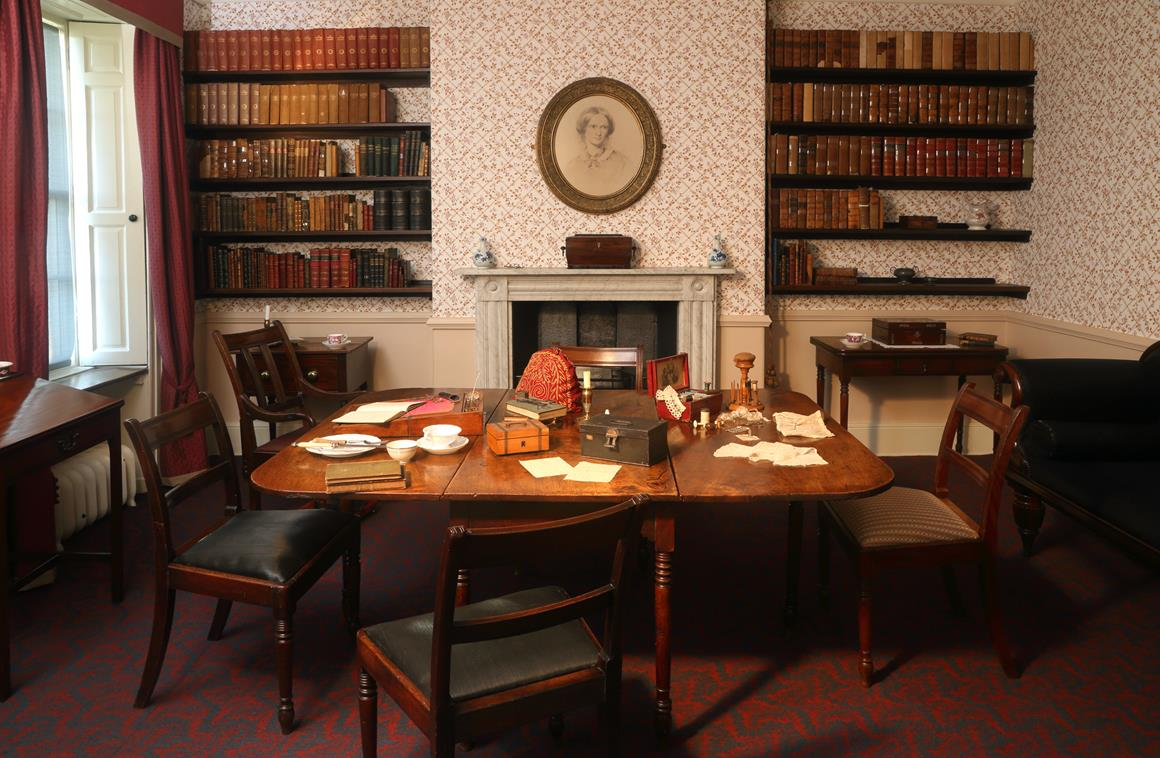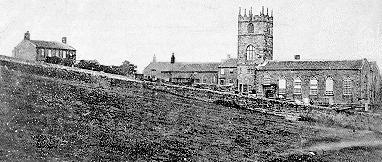She set about marshalling a small trousseau for the visit. November 1849 Charlotte sent out for London, armed with her new wardrobe, including the sable boa and cuffs that she had commissioned Ellen to buy for her that summer with money from Jane Eyre, along with a squirrel tipped for every day.
She went straight to the Smiths' house in Westbourne Place.
George Smith had assembled an illustrious party of guests.
I bought this book.
One of the pictures gives an idea about this kind of social event.
Elizabeth Gaskell ""The Life of Charlotte Brontë"":
At 7 o'clock Tackeray was announced.
"As to being happy, I am under scenes and circumstances of excitement; but I suffer acute pain sometimes, - mental pain, I mean. At the moment Mr. Thackeray presented himself, I was thoroughly faint from inanition, having eaten nothing since a very slight breakfast, and it was then seven o'clock in the evening. Excitement and exhaustion made savage work of me that evening. What he thought of me I cannot tell."
She told me how difficult she found it, this first time of meeting Mr. Thackeray, to decide whether he was speaking in jest or in earnest, and that she had (she believed) completely misunderstood an inquiry of his, made on the gentlemen's coming into the drawing-room. He asked her "if she had perceived the secret of their cigars;" to which she replied literally, discovering in a minute afterwards, by the smile on several faces, that he was alluding to a passage in Jane Eyre. Her hosts took pleasure in showing her the sights of London. On one of the days which had been set apart for some of these pleasant excursions, a severe review of Shirley was published in the Times. She had heard that her book would be noticed by it, and guessed that there was some particular reason for the care with which her hosts mislaid it on that particular morning. She told them that she was aware why she might not see the paper. Mrs. Smith at once admitted that her conjecture was right, and said that they had wished her to go to the day's engagement before reading it. But she quietly persisted in her request to be allowed to have the paper. Mrs. Smith took her work, and tried not to observe the countenance, which the other tried to hide between the large sheets; but she could not help becoming aware of tears stealing down the face and dropping on the lap. The first remark Miss Brontë made was to express her fear lest so severe a notice should check the sale of the book, and injuriously affect her publishers. Wounded as she was, her first thought was for others. Later on (I think that very afternoon) Mr. Thackeray called; she suspected (she said) that he came to see how she bore the attack on Shirley; but she had recovered her composure, and conversed very quietly with him: he only learnt from the answer to his direct inquiry that she had read the Times' article. William Makepeace Thackeray
George Smith and his mother took her to the Theatre, to the new Houses of Parliament, to the National Gallery, where Charlotte enjoyed the exhibition of Turner's paintings.
http://nl.wikipedia.org/wiki/William_Turner
Charlotte sent a note to Harriet Martineau, she wants to visit here.
---------------------------------------
Later she wrote to Ellen Nussey:
‘Haworth, December 19th, 1849.
‘Dear Ellen,—Here I am at Haworth once more. I feel as if I had come out of an exciting whirl. Not that the hurry or stimulus would have seemed much to one accustomed to society and change, but to me they were very marked. My strength and spirits too often proved quite insufficient for the demand on their exertions. I used to bear up as well and as long as I possibly could, for, whenever I flagged, I could see Mr. Smith became disturbed; he always thought that something had been said or done to annoy me, which never once happened, for I met with perfect good breeding even from antagonists—men who had done their best or worst to write me down. I explained to him, over and over again, that my occasional silence was only failure of the power to talk, never of the will, but still he always seemed to fear there was another cause underneath.
‘Mrs. Smith is rather stern, but she has sense and discrimination; she watched me very narrowly. When surrounded by gentlemen she never took her eye from me. I liked the surveillance, both when it kept guard over me amongst many, or only with her cherished one. She soon, I am convinced, saw in what light I received all, Thackeray included. Her “George” is a very fine specimen of a young English man of business; so I regard him, and I am proud to be one of his props.
‘Thackeray is a Titan of mind. His presence and powers impress me deeply in an intellectual sense; I do not see him or know him as a man. All the others are subordinate to these. I have esteem for some, and, I trust, courtesy for all. I do not, of course, know what they thought of me, but I believe most of them expected me to come out in a more marked eccentric, striking light. I believe they desired more to admire and more to blame. I felt sufficiently at my ease with all except Thackeray, and with him I was painfully stupid.
‘Now, dear Nell, when can you come to Haworth? Settle, and let me know as soon as you can. Give my best love to all.—Yours,
‘C. B.’
www.gutenberg.org
----------------------------------------------













Your new book looks wonderful Geri! How beautiful London looked back then. After watching the royal wedding today, I am more in awe of the old architecture from that era than ever...it's quite amazing.
BeantwoordenVerwijderenIt's so great that she was able to visit there and really see qute a bit of the city and all it had to offer...George really did take care of her well.
xo J~
It is with a curious peculiarity that I must tell you the 'at the ball' image features Charlotte herself - beside George Smith, on the right hand side, she is in the darker, patterned dress. The photo was taken in 1850 or 51, it wasn't so late as 53 or 54. I would recognise that narrow forehead and those close-together eyes, not to mention that foul dress, anywhere. How small indeed, yet with such a large head! x
BeantwoordenVerwijderen
BeantwoordenVerwijderenThe pace of the crowded London streets was quite different for CB, coming from Haworth ...however she would not fear anything left on the city's streets .In that way she was made of sterner stuff than those in London... because the refuse thrown out on Haworth's streets was worse ! She would have to travel closer to the London's east end to feel more at home lol